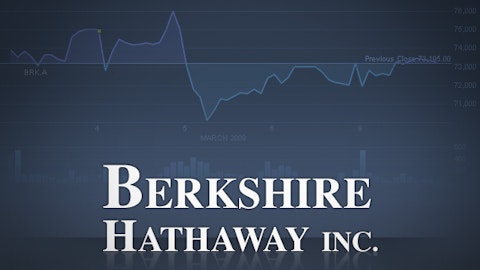
In fact, Icahn Enterprises LP (NASDAQ:IEP) is rarely mentioned in the same breath as a similar firm that also maintains a diversified basket of assets and investments such as Warren Buffett’s Berkshire Hathaway Inc. (NYSE:BRK.B). Although Berkshire’s revenues exceed Icahn’s by a factor of 10, the two companies are not structurally dissimilar. Both firms have their hands in a number of different industries and continue to make bold bets on future trends.
Indeed, there may be a timely parallel between the two firms. With its potential bid for Dell Inc. (NASDAQ:DELL), Icahn Enterprises LP (NASDAQ:IEP) may be taking a page straight out of Berkshire’s playbook for its successful 2009 acquisition of railroad giant BNSF. Investors who believe in the power of the Dell Inc. (NASDAQ:DELL) deal as well as Icahn’s general outlook may wish to take a closer look at its stock.
Icahn Enterprises at a Glance and the Dell Situation
New York-based Icahn Enterprises LP (NASDAQ:IEP) is a diversified investment firm that maintains a robust real estate portfolio and several other key assets. Its holdings include casinos, auto parts manufacturing plants, railcar manufacturing facilities, food packaging concerns, consumer goods firms, and others. Recently, it raised eyebrows by threatening a proxy battle for control of Dell.
Although the matter appears to be settled for the time being, the threat has not yet dissipated. Moreover, it seems likely that Icahn will at least attempt to find financing for a non-hostile takeover of the struggling computer manufacturer. Such an acquisition would have obvious ramifications for Icahn’s corporate structure and could raise the company’s profile by an order of magnitude.
While it remains unclear that Dell Inc. (NASDAQ:DELL)’s board would accept a takeover bid from an antagonistic minority shareholder, the computer firm may be out of reasonable alternatives. Now that private equity firm Blackstone (BX) has conclusively pulled out of the deal, Icahn’s potential bid remains the only reasonable option on the table. Investors who find the prospect of an eventual Icahn-Dell merger intriguing can make a strong case for nibbling at either company at these levels.
Financial Comparison with Berkshire
For value investors, Icahn Enterprises LP (NASDAQ:IEP)’s $4 annual dividend is quite attractive. During the company’s recent stock-price dip into sub-$60 territory, this equated to a yield of nearly 7 percent. Even at its current levels near $74, a $4 annual payout produces a 5.7 percent windfall. By comparison, Berkshire Hathaway Inc. (NYSE:BRK.B) lacks a dividend. While this has allowed the company to focus on growing through acquisitions and returning capital to shareholders by other means, it has been cited as a significant drawback.
On other metrics, Berkshire Hathaway Inc. (NYSE:BRK.B)’s finances appear to be in slightly better shape. In 2012, the company earned $14.8 billion on $162.5 billion gross revenue to achieve a profit margin of just over 9 percent. By contrast, Icahn earned $379 million on $15.7 billion gross revenue for a profit margin of less than 3 percent. Berkshire Hathaway Inc. (NYSE:BRK.B) also posted a nearly 50 percent quarterly earnings increase to Icahn’s 92 percent drop. To be fair, the two companies’ ROE and ROA metrics are virtually identical at about 8.5 percent and 3 percent, respectively. With nearly $3 in debt for every $1 in cash, Icahn uses more leverage than Berkshire Hathaway Inc. (NYSE:BRK.B). Compared to Berkshire’s free cash flow of over $10.5 billion, its cash outflow of nearly $3 billion is also problematic.
Other Moves
Icahn’s questionable financial situation is not stopping it from making other bold moves. The company recently expanded its stake in Netflix (NFLX) and raised $200 million in a secondary stock offering that temporarily crashed its shares. Given its cash flow issues, the offering was probably necessary. Fortunately, it does not seem to have affected investors’ perceptions of the stock. If key investments like Netflix continue to pan out, those who sold out of the stock prior to the secondary offering and failed to buy back in might come to regret their decisions.
Worth a Nibble?
Now that Icahn Enterprises LP (NASDAQ:IEP) has recovered much of the ground that it lost in the wake of its secondary offering, investors would be forgiven for thinking twice about making a move. Given its cash flow issues, it is not certain that Icahn will be able to carry on without further infusions of capital. In this light, it might be far-fetched for its long-term shareholders to expect dividend increases and other capital-return moves in the near future.
However the Dell deal does have the potential to change the conversation. If Icahn is able to increase its stake without angering Dell’s board or mount a leveraged buyout of the entire company, it could become a major player in the PC hardware industry. Moreover, it could use its leverage with Netflix to strengthen ties between the two companies.
Precise speculation is useless at this early stage, but it remains clear that a successful tie-up with Dell would warrant a major revaluation of Icahn. Going forward, yield-seeking investors may be inclined to nibble cautiously at Icahn here. In the event of a pullback, bigger bites might be in order. However, investors who have no need for yield may be better served by tried-and-true Berkshire Hathaway Inc. (NYSE:BRK.B).
The article Icahn Enterprises vs Berkshire Hathaway? originally appeared on Fool.com and is written by Mike Thiessen.
Copyright © 1995 – 2013 The Motley Fool, LLC. All rights reserved. The Motley Fool has a disclosure policy.



